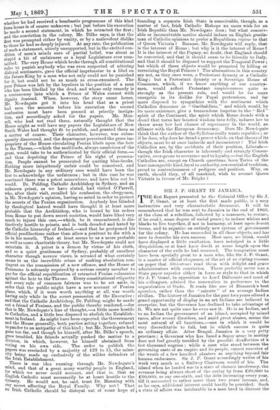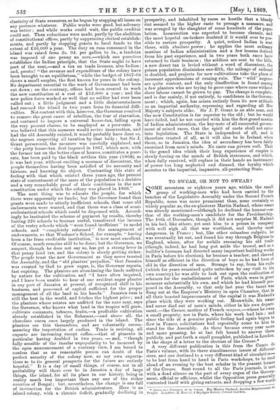SIR J. P. GRANT IN JAMAICA.
THE first Report presented to the Colonial Office by Sir J. P. Grant, or at least the first made public, is a very instructive and very characteristic document. It will be remembered that he was sent to Jamaica in the end of 1866, at the close of a rebellion, followed by a massacre, to restore, if he coul l, some degree of social peace to induce whites and blacks to live together, if not in harmony, at least upon decent terms, and to organize an entirely new system of government for the colony. He has succeeded in all those objects, and has now to describe his own success. Most men, we think, would have displayed a little exultation, have indulged in a little disquisition, or at least have dwelt at some length upon the character of the evils he had removed. The temptation must have been specially great to a man who, like Sir J. P. Grant, is a master of official eloquence, of the art of so stating reasons on paper that litterateurs read them with delight and grave administrators with conviction. There probably never was a State paper superior either in force or style to that in which Sir J. P. Grant, in opposition to Lord Dalhousie and most of his colleagues, advised the annexation in preference to the sequestration of Oude. It reads like one of Bismarck's best speeches, rather than the " minute " of an average Indian civilian. The history of Jamaica for the past two years offered a grand opportunity of display in an art Indians are believed to overprize, but the Governor has declined to take advantage of it. We are not quite sure he even saw it. He is an Indian, and to an Indian the government of an island, occupied by mixed races, after recent disorders, and amid great abuses, seems the most natural of all functions,—one in which it would be very discreditable to fail, but in which success is quite an ordinary affair. After Bengal, Jamaica is a very petty province ; a Governor who has faced a Sepoy army in mutiny does not feel greatly terrified by the possible disaffection of a few thousand negroes ; while a man who stood between the governing caste of an empire and its people, cannot conceive of the wrath of a few hundred planters as anything beyond fair human endurance. Sir J. P. Grant accordingly writes of his work very much as a Railway Chairman would of his. The island when he landed was in a state of chronic insolvency, the revenue being always short of the outlay by from £20,000 to £60,000, or say one-sixth, and the debt increasing every year, till it amounted to rather more than two years' income, and, as he says, additional interest could hardly be provided. Such a state of affairs was intolerable to a man bred to distrust the
elasticity of State resources, so he began by stopping all loans on any pretence whatever. Public works were good, but solvency was better ; and while works could wait, the public creditor could not. Then reductions were made, partly by the abolition of constitutional offices, partly by suppressing clerical establishments, and partly by stopping grants to local funds to the extent of £46,000 a year. The duty on rum consumed in the island was raised from 2s. 9d. per gallon to 5s., a land-tax was imposed of one penny an acre,—which one perceives establishes the Indian principle, that the State ought to have part of the rent,—and a tax on trade licences, also Indian ; and, presto ! "revenue and expenditure of the colony have been brought to an equilibrium," while the budget of 1867-68 shows a small surplus, the first known for years in the colony. No department essential to the work of Government had been cut down ; on the contrary, offices had been created to work the new constitution at a cost of £12,800 a year ; and the new police force worked so well that no soldier had ever been called out ; a little judgment and a little disinterestedness had rescued the island in two years from its financial difficulties. Not content with this, however, the Governor resolved to remove the great cause of rebellion, the fear of starvation, and ventured to impose a universal house-tax, falling upon the very poorest classes, to be employed as a poor-rate. It was believed that this measure would revive insurrection, and had the old Assembly existed, it would probably have done so, the negroes suspecting all taxation by that body ; but Sir J. Grant persevered, the measure was carefully explained, and the petty house-tax, first imposed in 1867, which now, with the former tax on the better class of houses, constitutes a poorrate, has been paid by the black settlers this year (1868), as it was last year, without exciting a murmur of discontent, the people themselves having been satisfied of its necessity and fairness, and knowing its object. Contrasting this state of feeling with that which existed three years ago, the present state of contentment of the mass of the population is a decisive and a very remarkable proof of their confidence in the new constitution under which the colony was placed in 1866."
The next thing was to educate the people, for which there were apparently no funds; but the Governor found that grants were made to utterly inefficient schools, that some old endowments were wasted, and that there was a class of semiecclesiastical schools which could be dispensed with. Accordingly he instituted the scheme of payment by results, thereby forcing 226 schools to become useful, transferred the income of the vestry schools which " were found inefficient " to model schools, and completely reformed " the management of endowments, so that Woolmer's School, for example, " having been a far from creditable institution," is now most excellent. Of course, much remains still to be done; but the Governor, we suspect, though he does not say so, has got a strong lever in that penny land tax, and the colony is slowly getting richer. The people trust the new Government as they never trusted the Assembly, and the "old planters' prejudice," that Jamaica was created by God to grow sugar, is, the Governor reports, fast expiring. The planters are abandoning the lands unfitted by nature for the cultivation, and "I have often inquired, and I have been unable to hear of one resident sugar planter in any part of Jamaica at present, of recognized skill in his business, and possessed of capital sufficient for the proper management of all the land in his hands." Jamaica rum is still the best in the world, and fetches the highest price ; and the planters whose estates are unfitted for the cane may, says the Governor, who knows what land in the tropics will grow, cultivate cocoanuts, tobacco, fruits,—a profitable cultivation already established in the Bahamas,—and above all, the chocolate cocoa once largely produced in the island. The planters see this themselves, and are voluntarily recommencing the importation of coolies. Trade is reviving, all exports are increasing except coffee,—that of pimento in particular having doubled in two years, — and, " though fully sensible of the insular unpopularity to be incurred by the open announcement of a contrary view, I am bound to confess that as no reasonable person can doubt of the perfect security of the colony now, so my own expectations as to its general prospects for the future are entirely hopeful." It is a day of small things, of course, nor in all probability will there ever be in Jamaica a day of large things, the island, for all its place in our history, being in reality much less important than any one of the richer counties of Bengal ; but, nevertheless, the change is one full of instruction for the British administrators. Here is an island colony, with a chronic deficit, gradually declining in prosperity, and inhabited by races so hostile that a bloody riot seemed to the higher caste to presage a massacre, and was avenged by the slaughter of some hundreds of the pope. lation. Insurrection was expected to become chronic, and the most hopeful on-lookers doubted if it would ever be possible to restore prosperity. A quiet, retired Indian is sent there, with absolute power ; he applies the moat ordinary maxims of Indian administration and a few lessons derived from his past experience, and in two years both races have returned to their business ; the soldiers are sent to the hills, a new direct tax is levied without a word of discontent, the prison population diminishes one-fifth, the mileage of railroad is doubled, and projects for new cultivations take the place of incessant apprehensions of coming ruin. The " wild" negroes are quite content, and the only disaffection is found among a few planters who are trying to grow cane where cane without slave labour cannot be grown to pay. The change is complete, and is due mainly, if not entirely, to confidence in the Govern. ment ; which, again, has arisen entirely from its new attitude as an impartial authority, repressing and regarding all Her Majesty's subjects alike. Sir J. P. Grant is an able man, and the new Constitution is far superior to the old ; but he would have failed, had he not carried with him the first grand maxim of Indian administration, the key-note of all successful government of mixed races, that the spirit of caste shall not enter into legislation. The State is independent of all, and is therefore trusted of all, as it will also be in Ireland, when there, as in Jamaica, the idea of ascendancy has been fairly exorcised from men's minds. No caste can govern well. That is the grand idea which their long experience of empire is slowly forcing on the minds of British statesmen, and which, when fully received, will replace in their hands an instrument of power too long neglected and disused, the loyalty which accretes to the impartial, impassive, all-protecting State.































 Previous page
Previous page